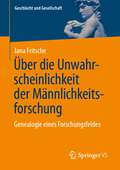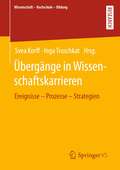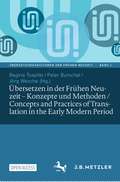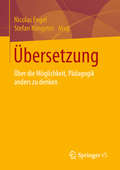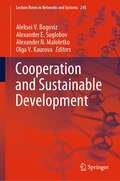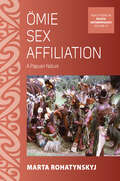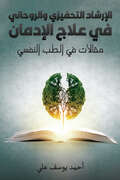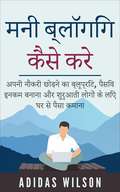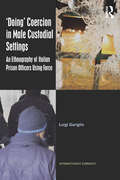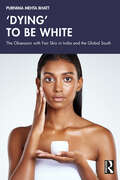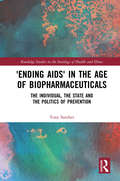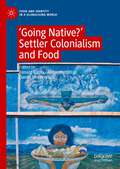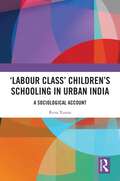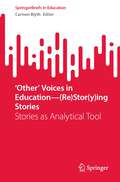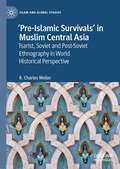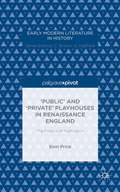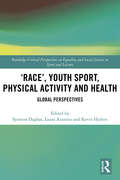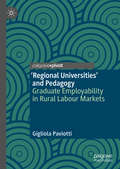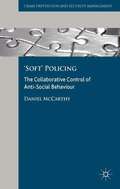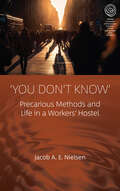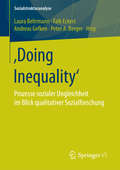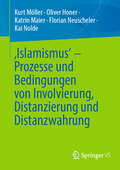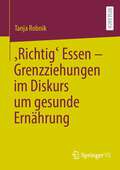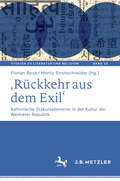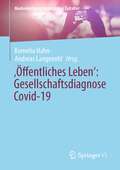- Table View
- List View
Über die Unwahrscheinlichkeit der Männlichkeitsforschung: Genealogie eines Forschungsfeldes (Geschlecht und Gesellschaft #80)
by Jana Fritsche‚Männlichkeit‘ gilt als lange gleichgesetzt mit dem ‚Allgemein-Menschlichen‘ und daher als Spezifikum regelrecht unsichtbar. Was macht das Nachdenken über und die Beforschung von ‚Männlichkeit‘ dann epistemologisch wie gesellschaftlich wahrscheinlich? Dieser Frage geht die vorliegende Studie aus gesellschaftstheoretischer Perspektive nach. Entlang sozialwissenschaftlicher Publikationen zu ‚Männlichkeit‘ von 1908-2022 werden gesellschaftliche Zusammenhänge rekonstruiert, die die (wissenschaftliche) Reflexivierung von ‚Männlichkeit‘ bedingen. Damit stellt die Studie eine erste systematische Untersuchung des Feldes der Männlichkeitsforschung dar. Zudem entpuppt sich das vergleichsweise kleine Forschungsfeld als reichhaltiges Labor, an dem sich über dessen Partikularität hinaus soziologische Grundfragen und methodologische Aspekte diskutieren lassen: darunter Subjekt-Gesellschaft-Verhältnisse, Epistemologie und Operationalisierung, Prozesse der Grenzziehungen und Stabilisierung wissenschaftlicher Disziplinen sowie die Bedeutung von Un-/Sichtbarkeit, Paradoxien und blinden Flecken von Beobachtungen.
Übergänge in Wissenschaftskarrieren: Ereignisse – Prozesse – Strategien (Wissenschaft – Hochschule – Bildung)
by Svea Korff Inga TruschkatWissenschaftskarrieren sind durch notwendige Übergänge im Sinne von Statuswechseln gekennzeichnet, wie z. B. durch die Promotion oder die Berufung. Als ebenso relevant lassen sich die vielen Erfahrungen verstehen, die in den jeweiligen Phasen bedeutsam werden. Auslaufende Verträge, Peer Review und Evaluationen etc. stellen Ereignisse dar, die entscheidend für das Erleben und das Fortsetzen der Laufbahn sind. Diese kleinen ggf. kritischen Ereignisse können somit als eine Vielzahl kleiner Übergänge verstanden werden. Während die Übergangs- und Hochschulforschung oftmals die zentralen Übergänge thematisieren, werden hier Beiträge versammelt, die explizit die kleinen Übergänge diskutieren.
Übersetzen in der Frühen Neuzeit – Konzepte und Methoden / Concepts and Practices of Translation in the Early Modern Period (Übersetzungskulturen der Frühen Neuzeit #1)
by Annkathrin KoppersDieser interdisziplinäre Open Access-Band beschäftigt sich mit den vielfältigen Konzepten und Methoden des Übersetzens als zentraler und ubiquitärer Kulturtechnik der Frühen Neuzeit (1450–1800). In fünfzehn Einzelstudien werden gesellschaftliche Leitvorstellungen, Wahrnehmungsmuster und Kommunikationsformen erforscht, die seit dem 15. Jahrhundert durch Praktiken des Übersetzens etabliert werden und bis in die Gegenwart von prägender Bedeutung sind. Behandelt werden etwa jiddische und kymrische Bibelübersetzungen, tamilische und zapotekische Missionstexte sowie französische und arabische Kartenmaterialien. This interdisciplinary open-access collection addresses the multifarious concepts and methods of translation as a central and ubiquitous cultural technique of the Early Modern period (1450–1800). It features fifteen studies on the guiding principles, perception patterns, and communication forms that have taken root in society since the fifteenth century through the practices of translation and are still of defining importance today. The research spectrum encompasses such diverse topics as Yiddish and Cymric translations of the Bible, Tamil and Zapotec mission texts, and French and Arabic cartographic material.
Übersetzung: Über die Möglichkeit, Pädagogik anders zu denken
by Nicolas Engel Stefan KöngeterIn diesem Band wird mittels des Übersetzungsbegriffs die Möglichkeit verhandelt, Pädagogik anders zu denken. Sozial- und kulturwissenschaftliche Übersetzungstheorien werden dabei genutzt, um die theoretische Produktivität von Übersetzung für die Pädagogik auszuloten: Als Topos pädagogischer Theoriebildung lassen sich mit Übersetzung Verhandlungen über die Bedeutung von Anderem und Anderen und über die Geltung von pädagogischem Wissen im Horizont eines möglichen oder zukünftigen Anders-Sein thematisieren. Ein pädagogischer Einsatz des Übersetzungsbegriffs verspricht zudem mögliche Antworten auf die Frage nach dem Wie der Vermittlung von Bedeutung und Wissen.Die Beiträge zielen dementsprechend im ersten Teil des Bandes darauf, Übersetzung als begriffliche Kategorie pädagogischer Theoriebildung zu entwerfen. In einem zweiten Teil wird Übersetzung als Analysekategorie der Begegnung kultureller Lebensformen und Ordnungen eingesetzt. Schließlich fokussiert der dritte Teil Formen der pädagogischen Theorieproduktion und erziehungswissenschaftlichen Wissensarbeit im transnationalen bzw. globalen Kontext.
Сooperation and Sustainable Development (Lecture Notes in Networks and Systems #245)
by Aleksei V. Bogoviz Alexander E. Suglobov Olga V. Kaurova Alexander N. MaloletkoThis book presents a systematic view of the cooperative sector of the economy from the standpoint of sustainable development. On the one hand, the book reveals the consequences of business cooperation for the implementation of global sustainable development goals, primarily in terms of environmental protection and food security. On the other hand, the book defines the essence of sustainable development of the cooperative sector of the economy as a demonstrative economic practice that reflects the general state of socio-economic systems. Scientific, methodological, and applied recommendations for the systemic optimization of the management of the cooperative sector of the economy in the interests of simultaneously achieving its maximum positive impact on the implementation of sustainable development goals, as well as maintaining its stability are proposed.The book contains the best works based on the results of the International Scientific and Practical Conference “Cooperation and Sustainable Development”, which was held on December 15-16, 2020. Its target audience is scientists studying processes of business structures cooperation, business entities carrying out cooperation, as well as public authorities, which will find guidelines for improving state regulation of the cooperative sector of the economy in this book.
Ӧmie Sex Affiliation: A Papuan Nature (ASAO Studies in Pacific Anthropology #14)
by Marta RohatynskyjThe practice of affiliating the female child with the mother and the male child with the father was considered a rare and inexplicable practice in Papua New Guinean ethnography at the time the original data was collected some forty years ago. Marta Rohatynskyj undertakes a shift in her analytical concepts of kinship studies to reveal the deep-seated disjuncture between female and male that this practice represents. The author argues that this practice is associated with a totemic/animistic ontology and has currency in a particular type of Melanesian society.
الإرشاد التحفيزي والروحاني في علاج الإدمان: مقالات في الطب النفسي
by Ahmed Aliالكتاب مقالات متخصِّصة عن المخدرات وأنواعها والإدمان بنوعَيه، مِن إدمان على المواد المخدِّرة، والإدمان السلوكي، مثل إدمان الإنترنت والمقامرة، وعلاج وتأهيل الإدمان بالعلاج الطبي والنفسي والإرشادي، ودمج المدمنين في المجتمع بعد تعافيهم، ثمَّ مقالات عن الطب النفسي مثل الوشوم والزار، ومغزاها النفسي.
मनी ब्लॉगिंग कैसे करे: अपनी नौकरी छोड़ने का ब्लूप्रिंट, पैसिव इनकम बनाना और शुरुआती लोगों के लिए घर से पैसा कमाना
by Adidas Wilsonब्लॉग ऑनलाइन पत्रिकाओं के रूप में शुरू हुए जहां लोगों ने अपने जीवन को साझा किया। लेकिन आज, लक्ष्य अधिक पेशेवर हैं। अधिकांश लोग अब अपने व्यवसाय या ब्रांड को बढ़ावा देने के लिए ब्लॉग करते हैं। यह पोस्ट ब्लॉगिंग के सामान्य कारणों और लाभों पर प्रकाश डालती है। लोगों को जो पसंद है उसे साझा करना पसंद करते हैं। यदि आप मछली पकड़ना पसंद करते हैं, तो आप पूरी दुनिया को इसके बारे में बताना चाहेंगे। यह अन्य चीज़ों जैसे कि मार्केटिंग, फ़ोटोग्राफ़ी आदि के लिए जाता है, ब्लॉगिंग के बारे में जो आप प्यार करते हैं वह आपको दूसरों के साथ जुड़ने में मदद करता है जो आपके जुनून को दुनिया भर में साझा करते हैं। एक ब्लॉग आपको दूसरों को सिखाने के लिए एक मंच देता है। जैसा कि आप ऐसा करते हैं, आप इस विषय के बारे में अधिक जानेंगे। एक ब्लॉग के माध्यम से शिक्षित करना आपके लिए आय की एक धारा खोल सकता है।
‘Doing’ Coercion in Male Custodial Settings: An Ethnography of Italian Prison Officers Using Force (Interactionist Currents)
by Luigi GariglioThis book offers a sustained study of one feature of the prison officer’s job: the threat and use of force, which the author calls ‘doing’ coercion. Adopting an interactionist, micro-sociological perspective, the author presents new research based on almost two years of participant observation within an Italian custodial complex hosting both a prison and a forensic psychiatric hospital. Based on observation of emergency squad interventions during so-called ‘critical events’, together with visual methods and interviews with staff, ‘Doing’ Coercion in Male Custodial Settings constitutes an ethnographic exploration of both the organisation and the implicit and explicit practices of threatening and/or ‘doing’ coercion. With a focus on the lawful yet problematic and discretionary threatening and 'doing’ of coercion performed daily on the landing, the author contributes to the growing scholarly literature on power in prison settings, and the developing field of the micro-sociology of violence and of radical interactionism. As such, it will appeal to scholars of sociology, anthropology and criminology with interests in prisons, power and violence in institutions, and visual methods.
‘Dying' to be White: The Obsession with Fair Skin in India and the Global South
by Purnima Mehta BhattThis book examines the phenomenon of colorism in India and the Global South and critically analyses the obsession with fair skin and its association with social capital or mobility.Exploring the prevalence of colorism in India, China, Japan, Vietnam, South Africa, Brazil, Argentina, Kenya and Australia, it traces its roots in history, scriptures, travel narratives, contemporary media and popular culture. How much did colonialism and European imperialism contribute to the desire to be white? How have globalization and the spread of consumer culture and Western ideals of beauty helped exacerbate these issues? The author discusses these questions while looking at the aspirations for beauty and modernity among these societies and the growing popularity of the use of creams, lotions and other methods to whiten the skin as a means to assimilate, emulate the West and gain better prospects and life.Lucid and topical, this book will be an essential read for scholars and researchers of race and colorism, sociology, social history, social anthropology, cultural studies, consumer economics, Asian studies and South Asian studies.
‘Ending AIDS’ in the Age of Biopharmaceuticals: The Individual, the State and the Politics of Prevention
by Tony SandsetThis book considers the change in rhetoric surrounding the treatment of AIDS from one of crisis to that of ‘ending AIDS’. Exploring what it means to ‘end AIDS’ and how responsibility is framed in this new discourse, the author considers the tensions generated between the individual and the state in terms of notions such as risk, responsibility and prevention. Based on analyses public health promotions in the UK and the US, HIV prevention science and engaging with the work of Foucault, this volume argues that the discourse of ‘ending AIDS’ implies a tension-filled space in which global principles and values may clash with localised needs, values and concerns; in which evidence-based policies strive for hegemony over local, tacit and communal regimes of knowledge; and in which desires compete with national and international ideas about what is best for the individual in the name of ‘ending AIDS’ writ large. As such, it will appeal to scholars of sociology and media studies with interests in the sociology of medicine and health, medical communication and health policy.
‘Going Native?': Settler Colonialism and Food (Food and Identity in a Globalising World)
by Alejandro Colás Daniel Monterescu Ronald RantaThis volume offers a comparative survey of diverse settler colonial experiences in relation to food, food culture and foodways - how the latter are constructed, maintained, revolutionised and, in some cases, dissolved. What do settler colonial foodways and food cultures look like? Are they based on an imagined colonial heritage, do they embrace indigenous repertoires or invent new hybridised foodscapes? What are the socio-economic and political dynamics of these cultural transformations? In particular, this volume focuses on three key issues: the evolution of settler colonial identities and states; their relations vis-à-vis indigenous populations; and settlers’ self-indigenisation – the process through which settlers transform themselves into the native population, at least in their own eyes. These three key issues are crucial in understanding settler-indigenous relations and the rise of settler colonial identities and states.
‘Labour Class’ Children’s Schooling in Urban India: A Sociological Account
by Reva YunusDrawing upon classroom ethnography and interviews with parents and pupils in urban central India, this book offers systematic sociological analyses of childhood, labour and schooling in postcolonial, post-liberalisation India. It combines insights from economic sociology, political economy and feminist critiques of capitalism, caste patriarchy and globalisation to theorise the relationship between educational experience and socioeconomic inequalities. A vital intervention in dominant development discourses centring on the relationship between poverty and poor children’s schooling in the global South it unpacks poverty as a structural condition shaped by class and caste relations. Unravelling the interplay of poverty, caste patriarchy and shifts in the gendered division of reproductive labour it challenges both the ‘girl effect’ narrative as well as the ‘school/labour’ binary. It offers insights into ‘labour class’ families’ experience of urban informal work enabling a critical account of the gendered place of school in children’s lives and render visible poor parents’ and pupils’ efforts to ensure educational success. Thick descriptions of pedagogic and disciplinary processes and social relations in the classroom allow it to grapple with teachers’ ‘deficit view’ of the labour class as well as the impact of stratified schooling on teachers’ working conditions and teacher-pupil relations. The book presents a rare account of teenaged children’s gendered modes of negotiation of social relations at school and home, waged and unwaged work, economic and educational deprivation and pedagogic practices in the classroom. It will appeal to scholars interested in the sociology of education and childhood, gender and caste inequalities, international development, poverty and urban informal work.
‘Other’ Voices in Education—: Stories as Analytical Tool (SpringerBriefs in Education)
by Carmen BlythThis book explores how stories can be used as ‘data’ that prefigure and make possible the numerous permutations of life that comprise existence, and examines how stories can be reconfigured to transform that existence into something 'other'. It uses varied theoretical and critical frameworks such as autoethnography and posthumanism with which to explore the stories shared that go ‘beyond cause and effect’. This book looks to engage with storying and storytelling as inquiry in non-Western ‘worlds’, and looks to make ‘storying’, ‘restor(y)ing’, and ‘stories’ written by non-Western educators the locus of attention. By doing so, it seeks to illustrate what distinctive ways of storying and storytelling can look like in worlds other than those that follow a Western ethico-onto-epistemological worldview. It provides a way to articulate thought that may be commonly omitted in teacher education around the world, and looks at ‘truth’ as situated rather than as totality, local rather than global, with stories used to problematize subject/object positionings within those same stories.
‘Pre-Islamic Survivals’ in Muslim Central Asia: Tsarist, Soviet and Post-Soviet Ethnography in World Historical Perspective (Islam and Global Studies)
by R. Charles WellerThe book traces the conceptual lens of historical-cultural ‘survivals’ from the late 19th-century theories of E.B. Tylor, James Frazer, and others, in debate with monotheistic ‘degenerationists’ and Protestant anti-Catholic polemicists, back to its origins in Jewish, Christian and Muslim traditions as well as later more secularized forms in the German Enlightenment and Romanticist movements. These historical sources, particularly the ‘dual faith’ tradition of Russian Orthodoxy, significantly shaped both Tsarist and later Soviet ethnography of Muslim Central Asia, helping guide and justify their respective religious missionary, social-legal, political and other imperial agendas. They continue impacting post-Soviet historiography in complex and debated ways. Drawing from European, Central Asian, Middle Eastern and world history, the fields of ethnography and anthropology, as well as Christian and Islamic studies, the volume contributes to scholarship on ‘syncretism’ and ‘conversion’, definitions of Islam, history as identity and heritage, and more. It is situated within a broader global historical frame, addressing debates over ‘pre-Islamic Survivals’ among Turkish and Iranian as well as Egyptian, North African Berber, Black African and South Asian Muslim Peoples while critiquing the legacy of the Geertzian ‘cultural turn’ within Western post-colonialist scholarship in relation to diverging trends of historiography in the post-World War Two era.
‘Public’ and ‘Private’ Playhouses in Renaissance England: The Politics of Publication (Early Modern Literature in History)
by Eoin Price‘Public’ and ‘Private’ Playhouses in Renaissance England.
‘Race’, Youth Sport, Physical Activity and Health: Global Perspectives (Routledge Critical Perspectives on Equality and Social Justice in Sport and Leisure)
by Kevin Hylton Symeon Dagkas Laura Azzarito‘Race’, Youth Sport, Physical Activity and Health provides a resource that addresses ‘race’ and racism in an accessible way by contextualizing theory with practical evidence-based examples drawn from global geographical and cultural settings. This is the first book to focus on issues of ‘race’ and racism in youth sport, physical activity and health. Drawing on critical race theory, intersectionality and post-feminism, and presenting a range of international empirical case studies, it explores racialization processes in pedagogical and non-pedagogical settings. The book examines how ‘race’ and racism in pedagogical settings shape young peoples’ dispositions towards participation in sport and physical activity, and how identity discourses are being shaped in contemporary sport, physical activity and health. Essential reading for anybody working in sport and exercise studies, physical education, sociology or health studies.
‘Regional Universities’ and Pedagogy: Graduate Employability in Rural Labour Markets
by Gigliola PaviottiThis book explores the issue of graduate employability in rural labour markets. European higher education institutions are expected to be crucial players in terms of regional innovation, contributing through research, education and formation of human capital. The author asks how this role be played out equally in urban and rural areas. In rural areas, the most educated young members of society often find it impossible to contribute to the local economy and feel forced to seek better prospects in urban centres. The author examines the roles of higher education in rural centres, as well as the transitions from education to work by taking the point of view of students and graduates. Finally, the book offers advice for pedagogies that support the increase of employability potential for rural economies.
‘Soft’ Policing: The Collaborative Control of Anti-Social Behaviour (Crime Prevention and Security Management)
by Daniel MccarthyExamining multi-agency working in response to anti-social behaviour, this book investigates the way in which the police, social work teams and the youth justice service work together on early intervention initiatives to help young people, and explores the complexities and practical struggles of these partnerships.
‘You Don’t Know’: Precarious Methods and Life in a Workers' Hostel (EASA Series)
by Jacob A. E. NielsenPeople employed at sites of precarious work such as call centres or retail warehouses often live precarious lives. Drawing on ethnographic research in a London hostel for precarious workers, the book explores the political, analytical and practical limitations of using traditional methods of trying to make sense of life in these settings. Traditional methods are rooted in practices that emerge from privileged social positions and their enactment is deeply entangled with the processes that create these conditions in the first place. This book responds to this by experimenting with ‘precarious methods’ to enable greater agency to those placed in these precarious situations.
‚Doing Inequality‘: Prozesse sozialer Ungleichheit im Blick qualitativer Sozialforschung (Sozialstrukturanalyse)
by Peter A. Berger Laura Behrmann Falk Eckert Andreas GefkenDie Beiträge des Bandes zeigen und diskutieren das Potenzial einer mikrosoziologischen, prozessorientierten – qualitativen – Ungleichheitsforschung. Sie spüren Praktiken sozialer Besser- und Schlechterstellung in den Bereichen Bildung, Arbeit, soziale Beziehungen und Migration auf. Mit der interpretativen, handlungstheoretischen oder praxissoziologischen Perspektive machen sie das „Doing Inequality“, die Gemachtheit und die Vollzugswirklichkeit sozialer Ungleichheit sowie die Rolle von Akteuren bei der Herstellung, der Reproduktion und dem Wandel von sozialen Ungleichheiten zentral. Soziale Ungleichheiten ergeben sich aus der regelmäßig ungleichen Verteilung „wertvoller Güter“ einer Gesellschaft. Doch wie werden diese zugeteilt, angeeignet oder vorenthalten?
‚Islamismus‘ - Prozesse und Bedingungen von Involvierung, Distanzierung und Distanzwahrung
by Oliver Honer Kurt Möller Kai Nolde Katrin Maier Florian NeuschelerWarum und wie wird jemand zu einem sogenannten Islamisten oder zu einer Islamistin? Wieso, auf welche Weise und wann erfolgen Distanzierungen von solchen Haltungen und Sozialzusammenhängen? Was sind relevante Bedingungen dafür, dass ‚islamistische‘ Ansprachen bei anderen Adressierten nicht verfangen und sie jegliche Involvierung ablehnen? Dies sind die zentralen Fragen, zu denen dieses Buch Antworten präsentiert und daraus abgeleitet Handlungsempfehlungen formuliert. Dafür fasst es den aktuellen Forschungsstand zusammen und informiert über die empirischen Befunde der an der Hochschule Esslingen von 2019 bis 2022 durchgeführten Studie Wendezeit. Es handelt sich um eine auf junge Menschen fokussierte, längsschnittlich angelegte und qualitativ-rekonstruktive Untersuchung. Sie basiert auf Interviews mit 44 ehemalig ‚islamistisch‘ involvierten Proband:innen bzw. mit solchen, die Kontakte zu ‚islamistischen‘ Kontexten hatten, aber Distanz wahrten. In ausgewählten Fällen wurden Gespräche mit Distanzierungsberater:innen und Umfeldangehörigen der Betroffenen in die Auswertung einbezogen.
‚Richtig‘ Essen – Grenzziehungen im Diskurs um gesunde Ernährung
by Tanja RobnikDie vorliegende Studie fokussiert auf die diskursive Herstellung ‚richtiger‘ Ernährung und deren Bedeutung für die Ordnung moderner Gesellschaften. Sie analysiert gegenwärtige massenmediale Thematisierungen von Ernährung anhand der Leitfrage, wie entlang von Ernährungsdebatten die Normierung und Moralisierung sozialer Ordnung empirisch geschieht. Die Frage nach der ‚richtigen‘ Ernährung wird als Diskurs verortet, der die empirischen Verhandlungen des ‚was‘ (das ‚richtige‘ Essen), ‚wie‘ (‚richtige‘ Körper) und ‚wer‘ (die ‚Essenden‘) des Essens bzw. der Ernährung sichtbar macht. Das Forschungsvorhaben zielt dabei darauf ab, die eine ‚richtige‘ Ernährung im Sinne einer Baukastenanleitung herauszuarbeiten. Es beobachtet vielmehr, dass Ernährung gesellschaftlich erklärungsbedürftig ist. Essverhalten und -entscheidungen brauchen Begründungen und sind nicht immer gleich akzeptiert. Der diskurstheoretische Blick auf diese Auseinandersetzungen zeigt, welche Wissensformationen sich durchsetzen, in welcher Form sich Ernährungswissen plausibilisiert und wie sich dadurch ein hegemonialer Diskurs über die ‚richtige‘ Ernährung und die Essenden zeigt.
‚Rückkehr aus dem Exil‘: Katholische Diskurselemente in der Kultur der Weimarer Republik (Studien zu Literatur und Religion / Studies on Literature and Religion #10)
by Florian Bock Moritz StrohschneiderDie Kultur der Weimarer Republik begeisterte sich in besonderem Maße für solche religiösen Ideen, von denen man sich Hilfe beim Umgang mit den allgegenwärtigen Krisenerfahrungen erhoffte. Auf diese Weise wanderten zahlreiche genuin katholische Überzeugungen und Positionen in den öffentlichen Diskurs ein und prägten gesellschaftliche Semantiken und Praktiken. Solche katholischen Diskurselemente, die außerhalb des gesellschaftlichen Teilsystems Religion, aus dem sie eigentlich stammen, und damit auch jenseits der katholischen Milieus wirksam und einflussreich waren, stehen im Fokus dieses interdisziplinär angelegten Bandes.
‚Öffentliches Leben‘: Gesellschaftsdiagnose Covid-19 (Medienkulturen im digitalen Zeitalter)
by Andreas Langenohl Kornelia HahnMit Ausbruch der Covid-19-Pandemie beobachten wir plötzlich gravierende Veränderungen des sozialen Lebens, die die aktuelle Situation als tragisches Krisenexperiment fungieren lassen – ein Experiment, das sich besonders auch im Hinblick auf die Konzeptualisierung von Öffentlichkeit und die soziologische Beobachtung empirischer Öffentlichkeiten zeigt. Nicht zuletzt aufgrund des Drucks öffentlicher Kommunikation hat die Covid-19-Pandemie global zu fast vergleichbaren gesellschaftspolitischen Reaktionen geführt: Das öffentliche Leben ist innerhalb kürzester Zeit und flächendeckend wie nie zuvor eingeschränkt worden. Diese Einschränkung wird als fraglose Gegenmaßnahme kommuniziert, die sich aus der Art der pandemischen Bedrohung rational ableitet. Aus einer öffentlichkeitssoziologischen Sicht manifestiert sich in dieser Reaktion eine Gesellschaftsdiagnose mit Universalismusanspruch, die indes ambivalent bleibt: In Zeiten von Epidemien gilt öffentliches Leben als ebenso gefährlich wie gefährdet.
